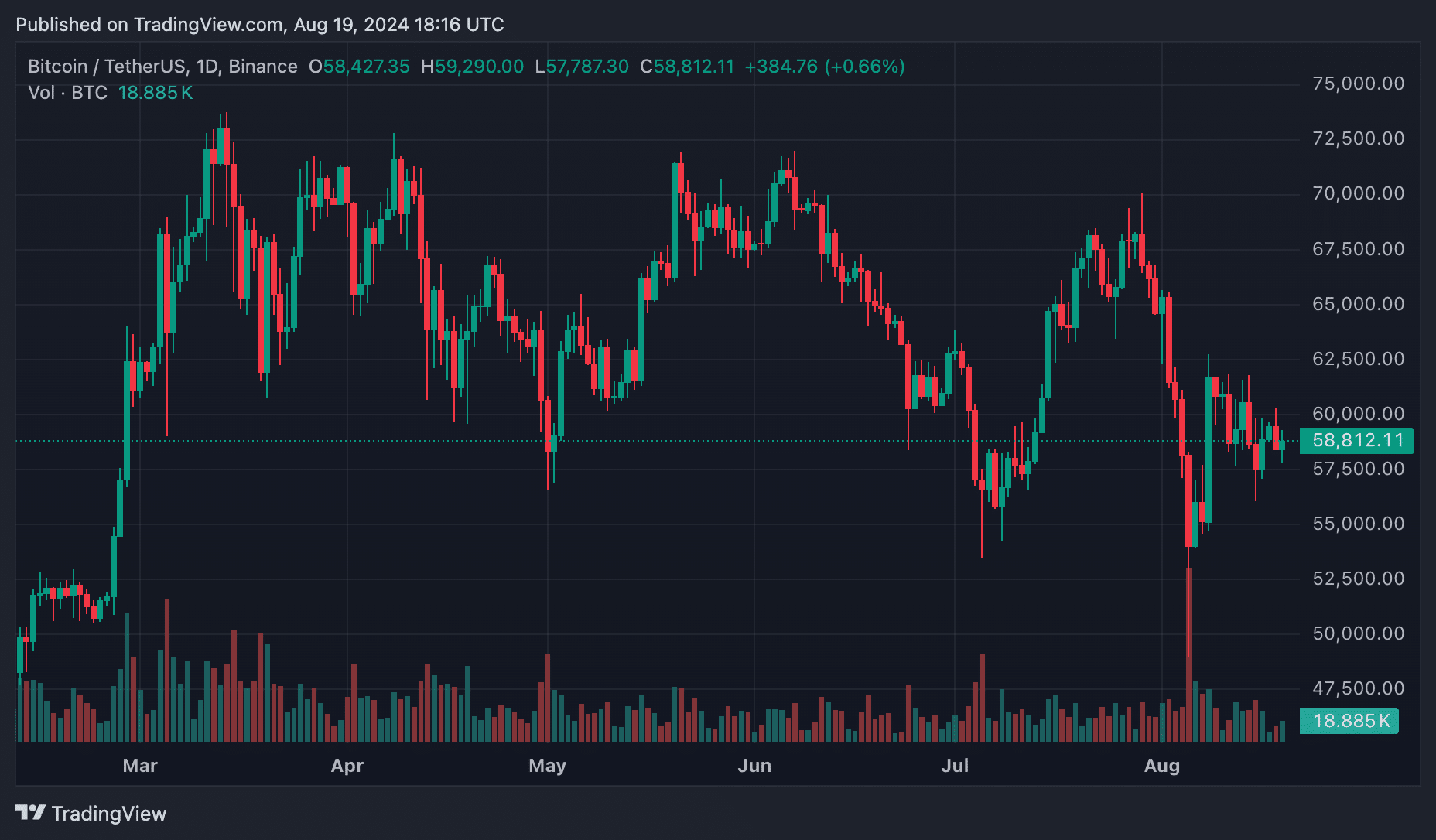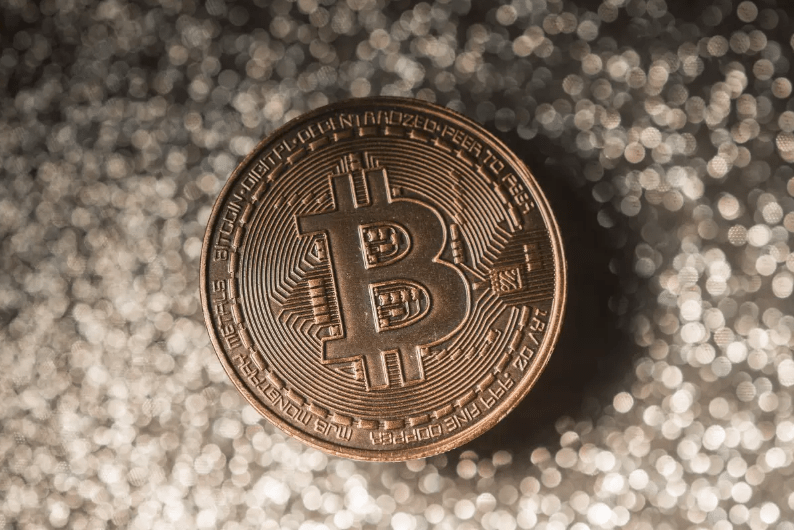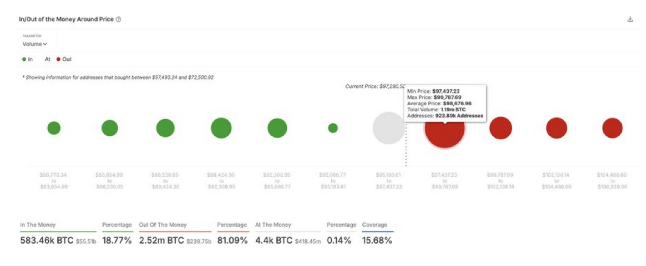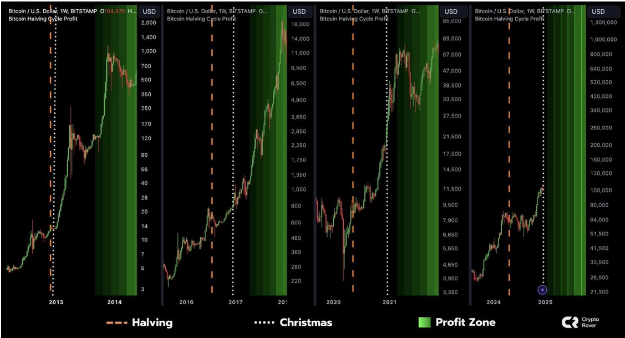Bitcoin
Analysts reveal bullish case for Bitcoin as global liquidity rises
Published
4 months agoon
By
admin
The stage looks set for Bitcoin to surpass its previous all-time high, fueled by a surge in global liquidity, several macroeconomic analysts argue.
In recent weeks, the global macro financial outlook has been showing signs of a shift. Over the weekend, Goldman Sachs economists announced that they had lowered their estimations of the probability of a U.S. recession in 2025 from 25% to 20%.
This change came after the latest U.S. retail sales and jobless claims data were released, which suggested that the U.S. economy might be in better shape than many had feared.
The Goldman Sachs analysts added that if the upcoming August jobs report — set for release on Sept. 6 — continues this trend, the likelihood of a recession could drop back to their previously held marker of 15%.
The possibility of such a development has sparked confidence that the U.S. Federal Reserve might soon cut interest rates in September, possibly by 25 basis points.
The potential rate cuts have already begun to impact the markets, with U.S. stock indices, including the S&P 500, Nasdaq Composite, and Dow Jones Industrial Average, recording their largest weekly percentage gains of the year for the week ending on Aug. 16.
Alongside this relatively positive news for the U.S. economy, global liquidity has begun to rise. Historically, increasing liquidity and easing recession fears have often been catalysts for bullish trends in the crypto space.
So, let’s take a closer look at what’s happening globally and how these macroeconomic shifts could impact Bitcoin (BTC) and the entire crypto market in the coming weeks and months ahead.
Liquidity surge across global markets
To understand where BTC might be headed, we need to delve into the mechanisms behind the current liquidity surge and how it could impact the broader markets.
The U.S. liquidity flood
In the U.S., the Treasury appears poised to inject a massive amount of liquidity into the financial system. BitMEX cofounder and well-known crypto industry figure Arthur Hayes stated in a recent Medium post that this liquidity boost could push Bitcoin past its previous all-time high of $73,700. But why now?
One possible explanation is the upcoming presidential elections. Maintaining a strong economy is crucial, and this liquidity injection could be a way to ensure favorable conditions as the election approaches.
But how exactly is this liquidity going to be injected? The U.S. Treasury and the Fed have several powerful tools at their disposal, as Hayes lays out in his analysis.
First, there’s the overnight reverse repurchase agreement mechanism, or RRP, the balance of which currently stands at $333 billion as of Aug. 19, down significantly from a peak of over $2.5 trillion in December 2022.
Hayes explains that the RRP should be looked at as a major pool of “sterilized money” on the Fed’s balance sheet that the Treasury is evidently looking to get “into the real economy” — aka add liquidity. The RRP represents the amount of Treasury securities that the Fed has sold with an agreement to repurchase them in the future. In this process, the buying institutions — namely money market funds — earn interest on their cash overnight.

As Hayes points out, the drop in overnight RRP over the past year indicates that money market funds are moving their cash into short-term T-bills instead of the RRP, as T-bills earn slightly more interest. As Hayes notes, T-bills “can be leveraged in the wild and will generate credit and asset price growth.” In other words, money is leaving the Fed’s balance sheet, adding liquidity to the markets.
The Treasury also recently announced plans to issue another $271 billion worth of T-bills before the end of December, Hayes noted.
But that’s not all. The Treasury could also tap into its general account, the TGA, which is essentially the government’s checking account. This account holds a staggering $750 billion, which could be unleashed into the market under the guise of avoiding a government shutdown or other fiscal needs. The TGA can be used to fund the purchase of non-T-bill debt. As Hayes explains: “If the Treasury increases the supply of T-bills and reduces the supply of other types of debt, it net adds liquidity.”
If both of these strategies are employed, as Hayes argues, we could see anywhere between $301 billion (the RRP funds) to $1 trillion pumped into the financial system before the end of the year.
Now, why is this important for Bitcoin? Historically, Bitcoin has shown a strong correlation with periods of increasing liquidity.
When more money is sloshing around in the economy, investors tend to take on more risk. Given Bitcoin’s status as a risk asset — as well as its finite supply — Hayes argues that the increased liquidity means a bull market could be expected by the end of the year.
If the U.S. follows through with these liquidity injections, we could see a strong uptick in Bitcoin’s price as investors flock to the crypto market in search of higher returns.
China’s liquidity moves
While the U.S. is ramping up its liquidity efforts, China is also making moves — though for different reasons.
According to a recent X thread from macroeconomic analyst TomasOnMarkets, the Chinese economy has been showing signs of strain, with recent data reportedly revealing the first contraction in bank loans in 19 years. This is a big deal because it indicates that the economic engine of China, which has been one of the world’s main growth drivers, is sputtering.
🇨🇳 China liquidity injections picking up
Stimulus from the People’s Bank of China (PBoC) is picking up.
Modest-sized Reverse Repo injections are continuing and total PBoC liquidity injections are spiking above my “pay attention” line ($65bn), but are yet to conclusively remain… pic.twitter.com/n0Md8Kga6D
— Tomas (@TomasOnMarkets) August 15, 2024
To counteract this pressure, the People’s Bank of China has been quietly increasing its liquidity injections. Over the past month alone, the PBoC has injected $97 billion into the economy, primarily through the very same reverse repo operations.
While these injections are still relatively small compared to what we’ve seen in the past, they’re crucial in a time when the Chinese economy is at a crossroads.
But there’s more at play here. According to the analyst, the Chinese Communist Party’s senior leadership has pledged to roll out additional policy measures to support the economy.
These measures could include more aggressive liquidity injections, which would further boost the money supply and potentially stabilize the Chinese economy.
Over the past few weeks, the yuan has strengthened against the U.S. dollar, which could provide the PBoC with more space to maneuver and implement additional stimulus without triggering inflationary pressures.
The big picture on global liquidity
What’s particularly interesting about these liquidity moves is that they don’t seem to be happening in isolation.
Jamie Coutts, chief crypto analyst at Real Vision, noted that in the past month, central banks, including the Bank of Japan, have injected substantial amounts into the global money base, with the BoJ alone adding $400 billion.
The central banks are capitulating, the liquidity spigots are opening, and #Bitcoin is about to go much higher.
My composite global liquidity momentum model (MSI), has provided the first Bullish regime signal since November 2023. Recall that Bitcoin rallied 75% from Nov to… pic.twitter.com/ovF6qSHX8c
— Jamie Coutts CMT (@Jamie1Coutts) August 15, 2024
When combined with the $97 billion from the PBoC and a broader global money supply expansion of $1.2 trillion, it appears that there is a coordinated effort to infuse the global economy with liquidity.
One factor that supports this idea of coordination is the recent decline in the U.S. dollar. The dollar’s weakness suggests that the Federal Reserve might be in tacit agreement with these liquidity measures, allowing for a more synchronized approach to boosting the global economy.
Jamie added that if we draw comparisons to previous cycles, the potential for Bitcoin to rally is very high. In 2017, during a similar period of liquidity expansion, Bitcoin rallied 19x. In 2020, it surged 6x.
While it’s unlikely that history will repeat itself exactly, the analyst argues that there’s a strong case to be made for a 2-3x increase in Bitcoin’s value during this cycle — provided the global money supply continues to expand, and the U.S. dollar index (DXY) drops below 101.
Where could the BTC price go?
On Aug. 5, Bitcoin and other crypto assets suffered a sharp decline due to a market crash triggered by growing recession fears and the sudden unwinding of the yen carry trade. The impact was severe, with Bitcoin plummeting to as low as $49,000 and struggling to recover.
As of Aug. 19, Bitcoin is trading around the $59,000 mark, facing strong resistance between $60,000 and $62,000. The key question now is: where does Bitcoin go from here?

According to Hayes, for Bitcoin to truly enter its next bull phase, it needs to break above $70,000, with Ethereum (ETH) surpassing $4,000. Hayes remains optimistic, stating, “the next stop for Bitcoin is $100,000.”
He believes that as Bitcoin rises, other major crypto assets will follow suit. Hayes specifically mentioned Solana (SOL), predicting it could soar 75% to reach $250, just shy of its all-time high.
Supporting this view is Francesco Madonna, CEO of BitVaulty, who also sees the current market environment as a precursor to an extraordinary bullish phase.
Madonna highlighted a pattern he has observed over the past decade: during periods of uncertainty or immediate liquidity injections, gold typically moves first due to its safe-haven status.
Recently, gold reached its all-time high, which Madonna interprets as a leading indicator that the bull market for risk assets, including Bitcoin, is just beginning.
2/3 Gold #Gld saw that and just reached its ATH . By analyzing the last 10 years behaviour , Gold typically moves first during periods of uncertainty or immediate liquidity injections due to its safe-haven status. pic.twitter.com/5a3AUR4qAf
— Francesco Madonna (@CiccioMadonna) August 17, 2024
Madonna points out that after gold peaks, the Nasdaq and Bitcoin typically follow, especially as liquidity stabilizes and investors start seeking higher returns in growth assets.
Given that gold has already hit its all-time high, Madonna believes Bitcoin’s recent consolidation around $60,000 could be the calm before the storm, with $74,000 being just the “appetizer” and $250,000 potentially within reach.
4/4 This pattern has repeated itself over the last decade and more , with gold often being a leading indicator of liquidity changes. The fact #Gld reached its ATH screams the bull market just started ! 74k was just the appetizer, #Bitcoin at 250k in sight ! pic.twitter.com/SV0a1GreSL
— Francesco Madonna (@CiccioMadonna) August 17, 2024
As Coutts stated in a recent X post, the expansion of the money supply is a condition of a credit-based fractional reserve system like the one we have.
Without this expansion, the system risks collapse. The analyst argues that this “natural state” of perpetual growth in the money supply could be the catalyst that propels Bitcoin, alongside other growth and risk assets, into its next major bull market.
With the U.S., China, and other major economies all injecting liquidity into the system, we’re likely to see increased demand for Bitcoin as investors seek assets that can outperform traditional investments.
If these liquidity measures continue as expected, Bitcoin could be on the verge of another key rally, with the potential to break through its previous all-time high and set new records.
Disclosure: This article does not represent investment advice. The content and materials featured on this page are for educational purposes only.
Source link
You may like


Can Pi Network Price Triple Before 2024 Ends?


XRP’s $5, $10 goals are trending, but this altcoin with 7,400% potential takes the spotlight


CryptoQuant Hails Binance Reserve Amid High Leverage Trading


Trump Picks Bo Hines to Lead Presidential Crypto Council


The introduction of Hydra could see Cardano surpass Ethereum with 100,000 TPS


Top 4 Altcoins to Hold Before 2025 Alt Season
Altcoins
Bitwise CIO Matt Hougan Predicts Institutional Interest in Altcoins, Says 2025 the Year of Crypto Diversification
Published
15 hours agoon
December 22, 2024By
admin
Bitwise CIO Matt Hougan says a wave of institutional interest in altcoins is coming next year, largely due to potential regulatory clarity and more exchange-traded funds (ETFs).
In a new interview with Bloomberg, Hougan says that institutional money is in the early stages of broadening out to other crypto assets besides just Bitcoin (BTC).
Hougan forecasts that 2025 will be the year that institutional investors will begin to incorporate more diversification in their crypto-investing strategies the same way they do in other asset classes like equities or bonds.
“You’re already seeing it broaden out actually. A lot of people were worried about the Ethereum ETFs for instance, which launched this summer and had tepid inflows.
But over the last month or so, you’ve seen billions of dollars flow into those products.
Again, the things that have happened in crypto in the past keep happening. Historically, most people enter crypto through Bitcoin, and then they discover Ethereum, and then they think about Solana. There’s no reason to assume that the institutions that came into Bitcoin won’t move on to other assets in the future.
In fact, I think in 2025, you’re going to see an explosion of interest in index space strategies that give diversified exposure to crypto. Of course, [that is] something we’ve been doing at Bitwise since 2017 when we pioneered that concept. I think 2025 is when that becomes a mainstream way to allocate to this space, the same way it is to stocks and bonds and real estate and everything else.”
Don’t Miss a Beat – Subscribe to get email alerts delivered directly to your inbox
Check Price Action
Follow us on X, Facebook and Telegram
Surf The Daily Hodl Mix
 

Disclaimer: Opinions expressed at The Daily Hodl are not investment advice. Investors should do their due diligence before making any high-risk investments in Bitcoin, cryptocurrency or digital assets. Please be advised that your transfers and trades are at your own risk, and any losses you may incur are your responsibility. The Daily Hodl does not recommend the buying or selling of any cryptocurrencies or digital assets, nor is The Daily Hodl an investment advisor. Please note that The Daily Hodl participates in affiliate marketing.
Featured Image: Shutterstock/Julien Tromeur/Sensvector
Source link
Bitcoin
Microsoft says ‘no’ to Bitcoin, corporates say ‘bring it on’
Published
1 day agoon
December 22, 2024By
admin

Microsoft shareholders nixed a Bitcoin treasury idea, but other big-name companies disagree with this strategy. Here’s why.
Bitcoin (BTC) is often likened to “digital gold,” with its fixed supply of 21 million coins making it a potential hedge against currency devaluation and inflation.
And nowadays, Bitcoin’s unique characteristics make it an attractive addition to corporate treasuries. It can balance exposure to traditional assets like cash, stocks, and bonds.
Bitcoin is also one of the most liquid assets globally, and its historical performance has shown significant long-term value appreciation — it reached an all-time high of over $108,000 on Dec. 17.
But there’s no shortage of risks.
A board might avoid adopting a Bitcoin treasury due to the coin’s extreme price volatility, which can lead to substantial losses during downturns. Also, regulatory uncertainties pose potential threats as governments refine crypto policies. Additionally, liquidity challenges during market slumps can amplify price drops when offloading assets.
So it’s no wonder that, on Dec. 10, Microsoft’s board channeled the long-standing crypto skepticism of its co-founder, Bill Gates, and recommended ditching the proposa for a Bitcoin trasury. Gates himself has famously dismissed crypto as “100% based on greater fool theory” — ouch.
Bitcoin evangelist and MicroStrategy Chairman Michael Saylor was busy trying to woo Microsoft when he touted Bitcoin’s own meteoric returns and bragged about MicroStrategy’s stock soaring after their BTC splurge. His pitch? Bitcoin could boost Microsoft’s market cap while acting as a financial guardian angel.
Microsoft’s response? No, thanks.
Meanwhile, at least 10 other companies are embracing the MicroStrategy playbook.
Genius Group
Genius Group, an AI-powered education group, announced in November that it had completed the purchase of 110 Bitcoin for $10 million, at an average price of $90,932 per Bitcoin. The purchase made good on a promise to employ what it called a “Bitcoin-first” strategy where it planed to commit 90% or more of its current and future reserves to be held in Bitcoin, with an initial target of $120 million in Bitcoin.
Earlier this month, the company bolstered its Bitcoin treasury by acquiring 194 Bitcoin worth $18 million at an average price of $92,728 per Bitcoin.
Genius Group CEO Roger Hamilton credited Saylor’s Bitcoin treasury plan for the inspiration, adding that “more companies will see the benefits of establishing a Bitcoin treasury, and will be equipped with the clear steps to follow.”
Worksport
Worksport, a U.S.-based provider of pickup truck solutions, is adding cyptocurency to its corporate treasury strategy.
The Nasdaq-listed company announced on Dec. 5 that it would be adding Bitcoin (BTC) and XRP (XRP) to its treasury assets. This follows a resolution by the company’s board of directors, which approved an initial purchase of $5 million worth of BTC and XRP.
Worksport is committing 10% of its excess operational cash to this corporate pivot, it said in the announcement.
“Our upcoming adoption of Bitcoin (BTC) and XRP (Ripple) reflects our commitment to staying ahead of market trends while prioritizing operational efficiency and shareholder value. As we expand our product offerings and global reach, cryptocurrency has the potential to be a strong strategic complement,” Steven Rossi, chief executive officer of Worksport, said.
Amazon
Amazon shareholders, led by the National Center for Public Policy Research, are urging the Seattle-based company’s board to assess the potential benefits of adding Bitcoin to the company’s financial strategy.
The proposal, submitted on Dec. 6, aims to explore whether Bitcoin could protect and enhance shareholder value, especially amid persistent inflation and declining yields from traditional assets.
The National Center emphasizes Bitcoin’s robust performance—131% growth in the past year and 1,246% over five years—as evidence of its potential as an inflation hedge and a growth asset. The initiative also highlights concerns about the diminishing purchasing power of Amazon’s $88 billion cash reserves due to average inflation of 4.95% over the past four years.
This move represents a broader trend of shareholder proposals influencing corporate policies, leveraging shareholder rights to advocate for financial strategies that address economic risks and enhance long-term value.
MicroStrategy
Perhaps the most vocal of all Bitcoin fans is MicroStrategy’s Saylor who, as of this past week, increased the company’s total holdings to 439,000.
As a result, Saylor has officially strengthening MicroStrategy’s position as the top corporate BTC holder, considering it a long-term store of value.
Saylor, during an appearance on the Dec. 18 episode of the Open Interest show on Bloomberg Television, even voiced his willingness to advise President-elect Donald Trump on crafting a digital assets policy for the U.S.
But Saylor continues to draw scrutiny: Analyst Jacob King has labeled MicroStrategy’s Bitcoin-focused business model a “giant scam,” claiming it is unsustainable and destined for collapse.
MicroStrategy’s business model is a giant scam and relies on a reflexive loop: it issues debt or equity to buy BTC, which drives BTC’s price higher. This increases MSTR’s market cap, boosts its index weight, and attracts more sheep investors. With a higher valuation, it issues… pic.twitter.com/Owyi7mCHaO
— Jacob King (@JacobKinge) December 17, 2024
Marathon Digital Holdings
As one of the largest Bitcoin mining companies, Marathon owns 44,394 BTC. Its business model revolves entirely around mining and holding Bitcoin as part of its assets.
Back in July, the company confirmed it will adopt “a full HODL approach” towards its Bitcoin treasury policy, retaining all that it mines within its operations, in addition to its open market purchases.
“Adopting a full HODL strategy reflects our confidence in the long-term value of bitcoin,” CEO Fred Thiel stated. “We believe bitcoin is the world’s best treasury reserve asset and support the idea of sovereign wealth funds holding it. We encourage governments and corporations to all hold bitcoin as a reserve asset.”
Tesla
Tesla initially bought $1.5 billion worth of Bitcoin in 2021 and currently holds 9,720 BTC. While the Elon Musk-led company remains a significant corporate holder.
BitcoinTreasuries data shows that Tesla is the fourth-largest holder of Bitcoin among U.S. public companies with crypto treasuries (MicroStrategy, MARA Holdings and Riot Platforms are believed to hold more).
In October, the electric vehicle company reportedly moved $765 million worth of Bitcoin to unidentified wallets.
Coinbase
The cryptocurrency exchange holds 9,480 BTC as part of its reserves, leveraging its position as a major player in the digital asset ecosystem.
The Brian Armstrong-led firm holds large amounts of Bitcoin as an exchange and converter. It’s also a trusted institution for custody services, and counts the Bitcoin ETF coterie of BlackRock, Grayscale, 21Shares, Invesco, Valkyrie, Wisdom Tree and Franklin Templeton among its clients.
Therefore, Coinbase has a Bitcoin treasury for itself and oversees others.
Hut 8 Mining Corp
On Thursday, crypto.news reported that Hut 8, a Bitcoin mining company, added 990 Bitcoin to its reserves.
The company spent roughly $100 million to increase its total holdings to 10,096 BTC. The reserve, now valued at over $1 billion, places Hut 8 among the largest corporate Bitcoin holders globally.
The company, under the guidance of CEO Asher Genoot, purchased the coins at an average price of $101,710, significantly higher than its cumulative acquisition cost of $24,484 per Bitcoin.
Block Inc.
The startup (formerly Square) holds 8,027 BTC as part of its strategy to integrate Bitcoin into mainstream finance.
The Jack Dorsey-founded company is so bullish on Bitcoin that, last month, it confirmed a company-wide pivot towards the cryptocurrency mining sector.
Block decided to dial down resources towards music streaming service TIDAL, and sunset TBD, a venture focusing on decentralizing the internet, to focus on expanding its presence in the Bitcoin mining sector.
Block acquired TIDAL in a 2021 acquisition for roughly $300 million. The platform has continued to struggle, with reports indicating workforce reductions and a $132.3 million impairment charge.
OneMedNet
OneMedNet Corp., as of Nov. 12, owns some 34 Bitcoins.
Off The Chain Capital, an investor in OneMedNet, was also inspired by Saylor, betting that Bitcoin isn’t just a hedge but a springboard for its healthcare data innovation.
Aaron Green, the company’s CEO, stated, “By continuing to invest a portion of our assets into Bitcoin, we aim to not only safeguard our financial stability but also fuel the ongoing development and innovation within our iRWD platform.”
Source link
Bitcoin
Why $99,800 Is An Important Resistance To Break
Published
1 day agoon
December 21, 2024By
admin
The Bitcoin price is approaching the $100,000 level again after experiencing significant declines these past weeks. A crypto analyst has pointed out that the critical resistance level at $99,800 is crucial for Bitcoin’s next move. If the pioneer cryptocurrency can break through this level, it could trigger a significant breakout, potentially propelling Bitcoin past the $100,000 mark.
Related Reading
Bitcoin Price Faces Resistance At $99,800
Prominent crypto analyst Ali Martinez has shared a chart showing an In/Out of the Money Around Price (IOMAP) analysis of the distribution of Bitcoin wallets based on their purchase price. According to the analyst, the Bitcoin price is facing extreme resistance between the $97,500 and $99,800 price levels as it tries to breach $100,000 again.

Martinez noted that around this price range, approximately 923,890 wallet addresses had purchased over 1.19 million BTC. This price zone acts as an important resistance level because many Bitcoin holders may look to sell and break even, potentially exerting selling pressure.
In the IOMAP chart shared by Martinez, the green dots that signal ‘In the Money’ represent price levels below the current Bitcoin price, where wallet holders are in profit because they bought BTC at a lower value. On the other hand, the red dots that represent ‘Out of the Money’ show price levels of Bitcoin’s present value, where wallet holders are at a loss because they bought BTC at a higher price.
Lastly, the white dot indicates ‘At the Money’ and represents the current price of Bitcoin at an average of $98,676, where some crypto wallets see neither profit nor loss.
Below Bitcoin’s current price, the chart shows strong buying zones, which could provide strong support if the pioneer cryptocurrency experiences a potential pullback. Martinez has forecasted that breaking through the critical resistance range between $97,500 and $99,800 would signal the start of a bullish rally for Bitcoin, potentially leading it to a new all-time high.
Currently, the Bitcoin price is trading at $98,652, steadily rising to return to previous highs above $100,000. To a new all-time high, Bitcoin will have to surge by over 7%, surpassing its present ATH above $104,000.
Related Reading
Bitcoin’s Biggest Gains To Come After Christmas
A popular crypto analyst identified as the ‘Crypto Rover’ has expressed optimism about Bitcoin’s near-term price potential this Q4. According to the analyst, Bitcoin has historically experienced its most significant gains right after Christmas during the halving years.

The analyst shared a price chart showing Bitcoin’s market performance during each halving cycle. In the 2012 halving year, Bitcoin started a significant price rally, which extended into the following year. The same bullish trend occurred in the next halving years in 2016 and 2020, with Bitcoin hitting exponential price highs.
Based on this historical trend, Crypto Rover projects that Bitcoin could witness a similar bullish surge before the end of 2024, with the rally potentially continuing into 2025.
Featured image from Bloomberg Images, chart from TradingView
Source link

Can Pi Network Price Triple Before 2024 Ends?

XRP’s $5, $10 goals are trending, but this altcoin with 7,400% potential takes the spotlight

CryptoQuant Hails Binance Reserve Amid High Leverage Trading

Trump Picks Bo Hines to Lead Presidential Crypto Council

The introduction of Hydra could see Cardano surpass Ethereum with 100,000 TPS

Top 4 Altcoins to Hold Before 2025 Alt Season

DeFi Protocol Usual’s Surge Catapults Hashnote’s Tokenized Treasury Over BlackRock’s BUIDL

DOGE & SHIB holders embrace Lightchain AI for its growth and unique sports-crypto vision

Will Shiba Inu Price Hold Critical Support Amid Market Volatility?

Chainlink price double bottoms as whales accumulate

Ethereum Accumulation Address Holdings Surge By 60% In Five Months – Details

Ripple Transfers 90M Coins, What’s Happening?

Filecoin, Monero, and Lunex dominate smart investor portfolios

Bitwise CIO Matt Hougan Predicts Institutional Interest in Altcoins, Says 2025 the Year of Crypto Diversification

How Low Will Ethereum Price Go By The End of December?
182267361726451435

Why Did Trump Change His Mind on Bitcoin?

Top Crypto News Headlines of The Week

New U.S. president must bring clarity to crypto regulation, analyst says

Will XRP Price Defend $0.5 Support If SEC Decides to Appeal?

Bitcoin Open-Source Development Takes The Stage In Nashville

Ethereum, Solana touch key levels as Bitcoin spikes

Bitcoin 20% Surge In 3 Weeks Teases Record-Breaking Potential

Ethereum Crash A Buying Opportunity? This Whale Thinks So

Shiba Inu Price Slips 4% as 3500% Burn Rate Surge Fails to Halt Correction

Washington financial watchdog warns of scam involving fake crypto ‘professors’

‘Hamster Kombat’ Airdrop Delayed as Pre-Market Trading for Telegram Game Expands

Citigroup Executive Steps Down To Explore Crypto
Mostbet Güvenilir Mi – Casino Bonus 2024

NoOnes Bitcoin Philosophy: Everyone Eats
Trending

 3 months ago
3 months ago182267361726451435

 Donald Trump5 months ago
Donald Trump5 months agoWhy Did Trump Change His Mind on Bitcoin?

 24/7 Cryptocurrency News4 months ago
24/7 Cryptocurrency News4 months agoTop Crypto News Headlines of The Week

 News4 months ago
News4 months agoNew U.S. president must bring clarity to crypto regulation, analyst says

 Price analysis4 months ago
Price analysis4 months agoWill XRP Price Defend $0.5 Support If SEC Decides to Appeal?

 Opinion5 months ago
Opinion5 months agoBitcoin Open-Source Development Takes The Stage In Nashville

 Bitcoin5 months ago
Bitcoin5 months agoEthereum, Solana touch key levels as Bitcoin spikes

 Bitcoin5 months ago
Bitcoin5 months agoBitcoin 20% Surge In 3 Weeks Teases Record-Breaking Potential


